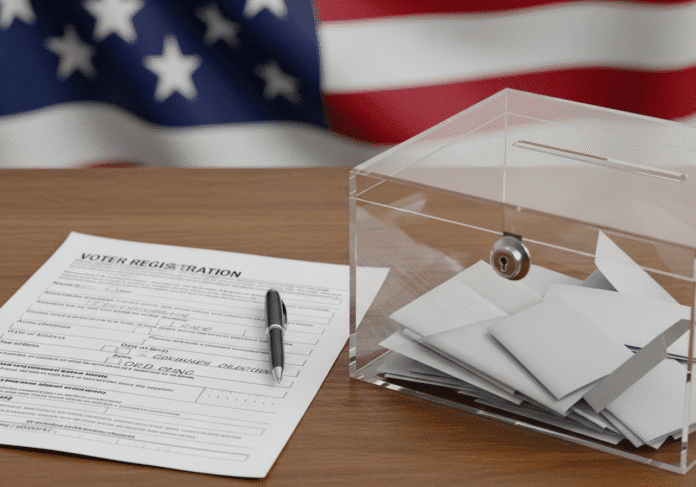Why the Trump Administration’s Push for Voter Rolls and Election Data Should Matter to Every American
By David LaGuerre-
When the Justice Department asks states for their voter rolls and election data, it isn’t just an administrative query—it’s a development that could have far-reaching consequences on our democratic process. As the Trump administration and its allies press forward with these requests, questions arise about the balance between election integrity and the protection of voter privacy. This isn’t merely a technical debate; it touches on issues that affect trust in our democracy, the security of our elections, and the fundamental right of every American to participate freely in the political process.
What Is Happening?
In July 2025, the Justice Department issued requests for voter rolls and detailed election data from at least nine states. These requests do not simply ask for the basic lists of eligible voters. Instead, they include comprehensive records from previous elections, details on how states manage voter registrations, and information on the security measures used to protect voting equipment. States like Colorado and Florida have provided publicly available data while other states are still reviewing the scope of the requests, raising questions on whether there is an overreach of federal oversight.
The Trump administration has continuously justified this push on the grounds of ensuring election integrity. Officials claim the aim is to verify that state practices comply with federal voting laws, such as the Help America Vote Act and the National Voter Registration Act. But this narrative becomes complex when one considers the enduring, and widely debunked, claims of widespread fraud in the 2020 election—a claim that has shaped much of the current partisan debate.
How Did We Get Here?
The current emphasis on obtaining extensive voter data did not begin in July 2025. Its origins can be traced back to earlier efforts and a longstanding narrative within the Trump administration. As early as the 2016 election, then-candidate Trump started raising alarms about voter fraud without providing convincing evidence. After the 2020 election, these concerns evolved considerably. Despite numerous investigations, courtroom judgments, and comprehensive audits, substantial evidence of widespread fraud never materialized.
Back in 2017, the administration created the Presidential Advisory Commission on Election Integrity. Led by figures like Kris Kobach, this commission demanded voter data from all 50 states. However, widespread resistance from state officials citing privacy concerns, along with a lack of compelling evidence for fraud, led to its disbandment in 2018. Today, the current effort builds on that legacy, continuing to push for state voter data under the guise of “protecting” election integrity, even as independent experts and courts have repeatedly debunked claims of electoral theft.
These historical efforts have left a lasting impact. Many Republicans still harbor doubts about the legitimacy of the last election, a belief reinforced by media and political narratives despite robust evidence to the contrary. This persistent skepticism has created a situation where federal requests for voter rolls, regardless of their intent, are viewed through an inherently partisan lens.
The Potential Uses and Risks of the Data
At first glance, proponents argue that collecting this data will help eliminate fraud. They point to the need to ensure that only eligible voters are participating. It is certainly true that a clean, up-to-date voter roll is essential for the efficient operation of elections. However, decades of research and numerous studies from organizations such as the Pew Research Center and the Brookings Institution confirm that instances of voter fraud in the United States are exceedingly rare.
Beyond the issue of fraud prevention, there are several other pressing risks worth considering:
Privacy concerns stand at the forefront. Voter rolls contain sensitive data—names, addresses, and sometimes additional personal identifiers. The aggregation of such detailed records potentially opens the door to misuse. There is a real fear among civil rights advocates that this data could later be used to target or intimidate voters, particularly in minority communities already feeling politically marginalized.
Election security is yet another critical issue. Consolidating large datasets increases the risk of cyberattacks or data breaches. When millions of personal records are stored in one place, they become a tempting target for hackers, especially at a time when trust in the security of our electoral infrastructure is already fragile.
Public trust in elections is vital for democracy to thrive. When federal or partisan agencies appear to use the pretext of “integrity” to obtain voter data, it sends a mixed message. On one hand, transparency is essential; on the other hand, the specter of political manipulation looms large. Even if the administration’s intentions are to scrutinize state practices, the resulting public perception can contribute to increased polarization and disillusionment among voters.
Why Should You Care?
For many Americans, the debate over voter rolls might seem like a technical discussion reserved for policymakers and election officials. But the implications run far deeper. Every time government agencies gain access to sensitive voter data, there is a ripple effect that touches every aspect of our democracy. More than just preserving data records, these actions influence how citizens see the legitimacy of the electoral process and whether they feel safe to cast their ballots without fear of repercussions.
When states are pressured into handing over comprehensive voter data, it risks shifting the balance from protecting elections to policing them. By pigeonholing states into a narrow view of electoral integrity, we risk marginalizing communities that are already underrepresented or targeted by voter suppression measures. The movement for wider voter access and fairness is built on a foundation of trust—a trust that is undermined when voters perceive data requests as politically motivated intrusions into their privacy.
Furthermore, the debate over voter data has broader implications for the health of democratic governance. When partisan interests dominate discussions about election integrity, the focus shifts away from genuine reforms that could benefit the entire society. Instead of fostering informed dialogue and crafting evidence-based policies, the debate becomes a battleground where misinformation and selective data are used to justify measures that ultimately restrict voter access.
For the average American, these developments are a warning sign. They suggest a growing trend where partisan interests interfere with what should be a neutral process: running free and fair elections. Protecting voter privacy and ensuring trust in our electoral systems aren’t just abstract ideals—they are prerequisites for a democracy that works for everyone.
Examining the Arguments on Both Sides
Supporters of the current voter data push maintain that the collection of this information is a necessary tool for election oversight. They argue that by acquiring detailed voter rolls and election data, the federal government can verify compliance with state voting laws and hold officials accountable if discrepancies arise. Polls have shown that a majority of Americans, regardless of party, support actions intended to safeguard the democratic process.
Yet, a closer look at the evidence tells a different story. Comprehensive studies by groups like the Pew Research Center have shown that the instances of voter fraud are statistically negligible. The same reports underline that current state-level safeguards—such as voter ID laws, rigorous audit procedures, and regular maintenance of voter registration databases—have been highly effective at preventing any form of widespread fraud.
Furthermore, the argument that collecting extensive voter data enhances transparency and accountability must be weighed against the significant risks to privacy and the potential for misuse. When sensitive information falls into the wrong hands or is weaponized for political gain, the consequences can be severe. The delicate balance between ensuring election integrity and preserving individual privacy is at the heart of this debate, and evidence-based research increasingly suggests that the scales are tipping in the wrong direction.
Critics also note that these federal data requests could be interpreted as part of a broader political strategy to discredit election outcomes and undermine public trust in democratic institutions. When partisan actors are perceived as exploiting data for political ends, it not only sows division but also erodes the general confidence that the electoral system is unbiased and secure.
Reflecting on the Future of Our Democracy
It is clear that the current focus on obtaining voter rolls and election data is about much more than simply verifying registration information. It is a reflection of the deep-seated tensions that have come to define the American political landscape in recent years. As partisan narratives continue to dominate the conversation, it becomes increasingly important for all of us—voters, policymakers, and election officials—to advocate for reforms that balance security with privacy.
A forward-looking approach would involve reinforcing the measures that have consistently ensured our elections are free from significant fraud, while simultaneously implementing robust data protection standards. Federal and state authorities must work together transparently and nonpartisanly to guarantee that election oversight does not become an excuse for politically motivated overreach. It is imperative that future policies are driven by factual evidence rather than unfounded claims.
Our democracy is built on the principle that every eligible citizen has an equal right to vote and that their vote is respected. When efforts to secure election integrity stray into the realm of invasive data collection and potential voter suppression, it harms the very foundations of our political system.
The Conversation Continues
In today’s politically charged climate, conversations about voter data and election security are more than an academic exercise—they are a call to action. Every individual who cares about fairness, transparency, and the sanctity of democratic processes should be vigilant. The decisions made now will shape the character of future elections and the confidence that Americans have in their government.
We must demand that policy debates remain guided by evidence, respect for individual privacy, and commitment to democratic ideals. As citizens, we have the responsibility to hold our elected officials to high standards, ensuring that the tools meant to secure our elections do not inadvertently damage the very democratic principles they are meant to protect.
If you care about your right to vote, your privacy, and the future of our nation, it is crucial to stay informed and engage in these debates. Share your thoughts, discuss this issue with your community, and call for reforms that prioritize fairness over partisan gain. Our democracy depends on actions rooted in evidence, transparency, and a steadfast commitment to protecting every voter’s rights.
Leave a comment below or share this article with someone who believes in a fair and inclusive electoral process. Your voice matters, and together we can ensure that democracy remains robust in the face of political challenges.




